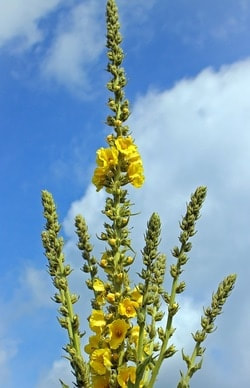
By NaturalDogHealthRemedies
Mullein
Verbascum thapsus
(Figwort family)
Mullein benefits dogs with persistent coughs as well as those with ear infections.
Mullein is a weed that can be found in much of North America. The leaves, flowers, and roots can be used to prepare tea, tincture, oil infusion, compress, poultice.
This herb contains mainly mucilage and small amounts of saponins and tannins. As such, it has antimicrobial and antiviral properties, and it soothes and protects mucous membranes. It is expectorant and can suppress cough and treat asthma.
Mullein
Verbascum thapsus
(Figwort family)
Mullein benefits dogs with persistent coughs as well as those with ear infections.
Mullein is a weed that can be found in much of North America. The leaves, flowers, and roots can be used to prepare tea, tincture, oil infusion, compress, poultice.
This herb contains mainly mucilage and small amounts of saponins and tannins. As such, it has antimicrobial and antiviral properties, and it soothes and protects mucous membranes. It is expectorant and can suppress cough and treat asthma.
Common Uses in Dogs
The leaves of this herb are effective in easing coughs while reducing inflammation and increasing mucus protection in the bronchi. Combined with its antimicrobial and antiviral properties, mullein proves to be excellent in treating kennel cough and various other forms of respiratory distress in dogs and other animals. A glycerin tincture can be given directly into the mouth (1-2 ml. per 20 lbs of animal's weight, twice daily).
Topically, the astringent and antimicrobial properties of the leaves are ideal for use treating minor wounds and insect bites. It speeds healing and is soothing to inflamed areas. Just mash up a few fresh or dried leaves with some water and apply the poultice to the affected area.
The leaves of this herb are effective in easing coughs while reducing inflammation and increasing mucus protection in the bronchi. Combined with its antimicrobial and antiviral properties, mullein proves to be excellent in treating kennel cough and various other forms of respiratory distress in dogs and other animals. A glycerin tincture can be given directly into the mouth (1-2 ml. per 20 lbs of animal's weight, twice daily).
Topically, the astringent and antimicrobial properties of the leaves are ideal for use treating minor wounds and insect bites. It speeds healing and is soothing to inflamed areas. Just mash up a few fresh or dried leaves with some water and apply the poultice to the affected area.
The flowers, in the form of an oil infusion, also have antimicrobial properties and are effective in treating ear infections, including those caused by ear mites. Combined with garlic oil, which is also antibacterial and antiviral, mullein garlic oil is a powerful healing oil for ear infections.
The flower oil infusion can also be used to fight against fleas and mange.
References
J.A. Duke, The Green Pharmacy Herbal Handbook: Your Comprehensive Reference to the Best Herbs for Healing (Rodale Books, 2000).
R. Kidd, Dr. Kidd's Guide to Herbal Dog Care (Storey Publishing, 2000).
M.L. Wulff-Tilford and G.L. Tilford, Herbs for Pets (Bowtie Press, 1999).
The flower oil infusion can also be used to fight against fleas and mange.
References
J.A. Duke, The Green Pharmacy Herbal Handbook: Your Comprehensive Reference to the Best Herbs for Healing (Rodale Books, 2000).
R. Kidd, Dr. Kidd's Guide to Herbal Dog Care (Storey Publishing, 2000).
M.L. Wulff-Tilford and G.L. Tilford, Herbs for Pets (Bowtie Press, 1999).















